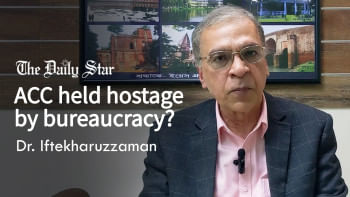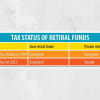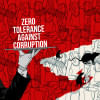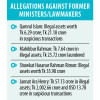Income Tax Act 2023: Yet another mortal blow to ACC

With the enactment of the Income Tax Bill, 2023, the Anti-Corruption Commission (ACC) has been inflicted such a mortal blow that it will now have to struggle to swim in the deep sea of corruption with legs and hands tied. The bill provides that the ACC cannot access tax, income, wealth and other related data of individuals under investigation for alleged corruption without a court order, the timely securing of which, in the abiding context, is likely to be a pipedream in most cases.
The ACC's expectations to catch the big fish or even small fries of corruption have thus been further undermined, while the scope of impunity of the corrupt has been reinforced. This is also rewarding news for forces outside and within the ACC who never wanted the commission to be effective. This has to be treated as yet another evidence on how the ruling party's pledge of zero tolerance against corruption, repeated quite often from the highest level, is blatantly undermined.
This is not the first time that the ACC's authority in the key areas of its mandate have been tactfully curtailed. One of the reasons that Bangladesh's Money Laundering Prevention Act, 2012 was considered to reasonably meet the global standard is the fact that it provided the ACC with full authority to investigate all the scheduled offences treated as money laundering. But for some inexplicable reasons except to chop off the powers of this specialised anti-corruption agency, the law was amended in 2015 to take away all but one category of offences out of 27 from its mandate. All remaining jurisdictions were handed over to authorities, most of whom heretofore had no track record of expertise or interest in anti-corruption work. By a single stroke, not only did the ACC lose its power, but the specialised tasks of anti-money laundering were converted into a tertiary assignment. Civil society and media concerns against the amendment met deaf years. The result, as ACC insiders lament, is that the ACC is now the whipping boy for all inactions or failures of effective actions against money laundering, though it is only marginally responsible.
The government's successive actions, including the Public Service Act, 2018, to deprive the ACC of the authority to take into custody any public officials for investigations on alleged involvement in corruption is no longer any important news. This demonstrated the government's high stake and determination to curtail ACC's investigative authority to selectively protect sections of public officials from accountability. It was also an example of violation of the constitutional pledge of equality before law.
An equally pernicious follow-up of such manipulative disempowerment of the commission to protect and promote those enjoying favour within the government and beyond took place on January 18, 2023, when the ACC's key executive authority was transferred to ACC bureaucracy. Though executed as an apparently inside job through an office order, this could not be viewed in isolation from the overall strategic trend to make the ACC legally and institutionally dysfunctional, which has now been crowned by the Income Tax Act, passed in parliament on June 18.
Sections 309 (2) and 309 (3) of the new Income Tax Act provide that notwithstanding the Evidence Act, 1872, Anti-Corruption Commission Act, 2004, or any other relevant law, no authority can order any employee of the republic to present, testify or produce as evidence any tax return, accounts or documents concerning any process under this law. This means that the ACC cannot access the income tax return of individuals under investigation for corruption, particularly for accumulation of income and wealth disproportionate to legitimate income.
This is not the first time that the ACC's authority in the key areas of its mandate have been tactfully curtailed. One of the reasons that Bangladesh's Money Laundering Prevention Act, 2012 was considered to reasonably meet the global standard is the fact that it provided the ACC with full authority to investigate all the scheduled offences treated as money laundering. But for some inexplicable reasons except to chop off the powers of this specialised anti-corruption agency, the law was amended in 2015 to take away all but one category of offences out of 27 from its mandate. All remaining jurisdictions were handed over to authorities, most of whom heretofore had no track record of expertise or interest in anti-corruption work.
In recognition of the key importance of these data for corruption investigation, the ACC Act made it mandatory for the relevant authorities to provide such information upon request and collaborate with the ACC as and when requested in the interest of investigation. The law even authorised the ACC to seek action from the government if any organisations failed to provide information the commission sought in the interest of corruption investigation. The Right to Information Act, 2009 also provides that access to corruption-related information cannot be treated as exempted.
Making it now conditional upon court order makes it practically impossible for the ACC to conduct any meaningful investigation of corruption based on illicitly earned income and wealth related data, unless it is small fries or individuals out of grace of the powers that be. This is contradictory to Article 20 (2) of the constitution, which criminalises unearned income. Creating arbitrary barriers against ACC's access to key information, as the new Income Tax Act does, will not only have a crippling effect on the process of ensuring accountability for corruption and illicit accumulation of income and wealth, but in reality it will protect and promote abuse of power and corruption. Overall, this will have a paralysing effect on the legal and institutional capacity of the state to control the cancerous disease of corruption.
The framers of this new secrecy provision as well as other examples cited above may have found it convenient to protect and strengthen their power base with short-term gains in view, but they have clearly ignored implications in terms of the government's own pledge against corruption. Belying such aspirations, signals are being sent systematically that there are legal, procedural and institutional provisions that actually invite and encourage people to engage in corruption.
All these show how public interest is trampled to serve kleptocratic interests, and how protection and promotion of corruption can make public policies and institutions ridiculed. By allowing such a corruption-friendly policy regime to take such deep roots, the government has not merely undermined its election pledge, which may perhaps be repeated soon, but also undercut the Perspective Plan 2021-41, which promises governance reforms for transparency and accountability and reduction of corruption and abuse of power. The Perspective Plan also makes a specific pledge to strengthen the Anti-Corruption Commission. What purpose do such pledges serve is anyone's guess.
Dr Iftekharuzzaman is executive director of Transparency International Bangladesh (TIB).

 For all latest news, follow The Daily Star's Google News channel.
For all latest news, follow The Daily Star's Google News channel. 











Comments